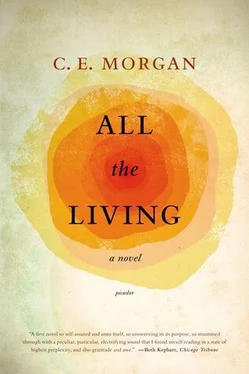After the service that resounded with amens and prayer like hollering, Aloma walked across the parking lot to her truck saying goodbye to the people she passed. Bell walked up behind her. She knew it was him when she heard or felt rather the coarse gravel of his voice as he spoke to the very same people she had just passed. She had reached her truck and placed her hand on the door handle, pretending she did not know he was there, feeling foolish even as she did it, when he said, Miss Aloma.
She turned.
Before you go, he said and he reached into the pocket of his trousers and fished among the coins that chinked and cuffed there until he found what he was looking for. I got something for you, he said.
What? she said and she could not keep her voice from sounding pleased.
Well, you come in here every day, he said. You’re more regular than this clock — and he shook his wrist so that his silver watch rattled — and you are a paid employee of this church, the only employee. You know I don’t get a thing to preach. I figured I might could give you a key to the building. He held out his hand in which a small gold key flashed like a wink and she stretched out her own hand and he passed it into her palm so that his fingertips brushed hers as he looked at her and said, I trust you. She wrapped her hand in a fist around the key so that its teeth bit her flesh.
Now you can practice anytime you care to, but better not at night, I reckon. And then he laughed, as though he’d said something funny, only he stopped abruptly and it was that laugh, and the awkward way in which he would not let himself do it, that filled Aloma with knowing. She looked up at him and said in not much more than a whisper, Thank you so much, Bell. And because he heard his first name in her mouth, he blushed.
Abruptly he turned to go, but then stopped, hesitating for a moment so that she did not know if he was coming or going and then he turned to face her again. He did not close the two steps he had opened between them. He studied the ground before her feet.
I got a thing to ask you, he said.
What’s that? she said.
He put his hands on his hips. Well, he said and he looked up now, not at her, but above her toward the sky, the way he sometimes did when he preached, as though God could be sought out in the rafters. Well, the other day when we all… when we did the picnic—
She blinked and it felt as though something very heavy were clinging to her lids.
Well, I seen you drive by, he said. I seen you drive by and not stop. And I just, I figure I just questioned why that was. He looked at her straight now, finally.
For a moment she only pressed the inside of her lower teeth with her tongue.
I don’t know. I guess I’m just shy, she said finally, and she hated herself powerfully as she said it, for it was not true exactly, but a seduction by meekness. She put her head down, not in reserve as it appeared.
Well, he said again, it’s too bad is all you didn’t stop and talk. Spend time with the church. Aloma remained where she was with her head down, but when he didn’t move, only stood there staring at her, she raised her head. His eyes were so direct she felt she could not match them, but sought instead the smaller details of his face, the straight nose, heavy winged brows, very black. She was not aware of smiling.
Bell Ray, a voice said and Bell turned and Aloma looked around the block of his shoulder. His mother stood ten feet away, and though there were people milling all around her, she passed the curious impression that she stood singularly amidst them. Her Bible was clutched in her hand and pressed to her small lowhung chest.
Yes, Mother, Bell said.
Bell, I need you, she said and she did not look at Aloma when she said this, only at Bell. He took a step toward his mother and then, as if remembering suddenly that he’d been speaking with Aloma, he faced her again and said, It would please me if you’d practice to your heart’s content. And then he turned and followed his mother into the crowd so that the people surrounded him and Aloma could see no more than the back of his dark and sunlit head.
Aloma found that the harder she worked around the house, the more she assuaged the stab of that slight pleasure, and it worked so well she forgot it happened at all. She already rose with Orren in the mornings to fix him breakfast and brew coffee, but now she walked out of the house with him and went down to the barn where she mixed the scratch with oyster shell as Orren had shown her and scattered it across the hay-strewn barn floor. She couldn’t say that she enjoyed it, but after a few weeks, it didn’t seem like such a chore, though it was a pity to be confronted with such stupidity as the chickens managed to reveal on a daily basis. When Orren rebuilt a small ramp that led from the coop to the floor, a laying hen fell off the ramp while walking up it and no amount of pecking and hunting helped her find it again because she was under it. So Aloma picked her up — and she hated to touch the chickens and feel the unexpected, distressing strength of their sinewy wings corrugated by veins and feathers — and placed the hen back on the ramp so she could fall off again. Eventually she resettled the hen’s nest on the barn floor. But aside from that, she found that she actually liked searching out the eggs and holding them, smooth and even in her hand — the fawn brown carapace of the eggs far more beautiful than the white, she thought — before she basketed them in the hem of her shirt. She studied the morning light as it forced itself through the pocked and splintered wood boards of the batten walls so that it shot through in silty bands of white like roughspun silk. It caught and lit the barn sediment as morning sun lights the mist and bugs that hover over the skin of a still river. And her walk back up to the house with the eggs cradled in her shirt and against her pale and rounded belly was a very fine walk. With the morning barely born and the new sun low, before the ugly countenance of her enclosure was featured by broad daylight, she felt good.
To her surprise, she found that she was learning to clean and cook with the speed of a woman who’d done it her whole life. The linseed oil on her hands became her workaday perfume. She always meant to go down to the new house to clean and organize — she had not really seen it since the day they took the kitchen supplies back up to the old house, when she had seen very little beyond its low-ceilinged kitchen. After that, she had been consumed with the cleaning and organizing of the big house and it was an endless task, really. Every time she turned her back, new dust collected and gray mice nested again and old closets began to smell like wet shoes so that she never had a moment to think about the new house at all and soon accepted that she would get down there only when she was able. It had been a long time since she’d even wondered when that would be. And while she cleaned, while she scrubbed and made plans for the mildewed upstairs bath, which was inhospitable — that’s what she had taken to calling it — she was so lost in the passing daydreams as they played across her mind, she failed to notice the figure of Bell showing up with determined frequency until he became a kind of constant unnoticed guest. And even when she returned to the church as she did for longer periods now, sometimes for up to four hours a day, she did not see — or chose to ignore — how her eyes sought immediately for Bell’s truck in the parking lot and how she played not quite as pertly, not as accurately, when he was not in the building. Her mind wandered when he was not hidden away in the privacy of his office so that she sometimes found herself stopped in the middle of a song she had memorized five years prior, and even rising from the piano in a fit of unrest to wander down a row of pews, stare out a window at the churchyard, the trees that lined one side of the parking lot, the sky beyond. The music had drawn her to this place, to this church, but now she looked out the windows more and more and played less and less. Only when Bell was not there. Otherwise, she drew all the force of her concentration to bear on the music before her and thought again how one day soon she would audition for a music program and then Orren would be ready to go with her, or maybe not… These were her thoughts on a Tuesday afternoon when Bell — who sometimes paused in the doorway to watch her play for a few moments but never came inside — walked into the sanctuary. He stood a few feet from the door, closer to the door than to her, and watched as she played.
Читать дальше
Конец ознакомительного отрывка
Купить книгу











